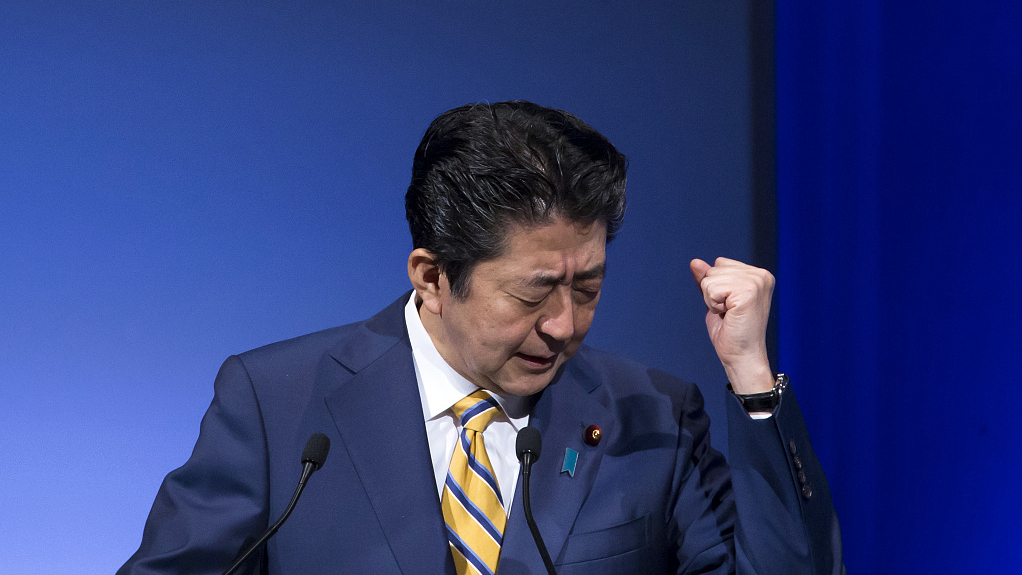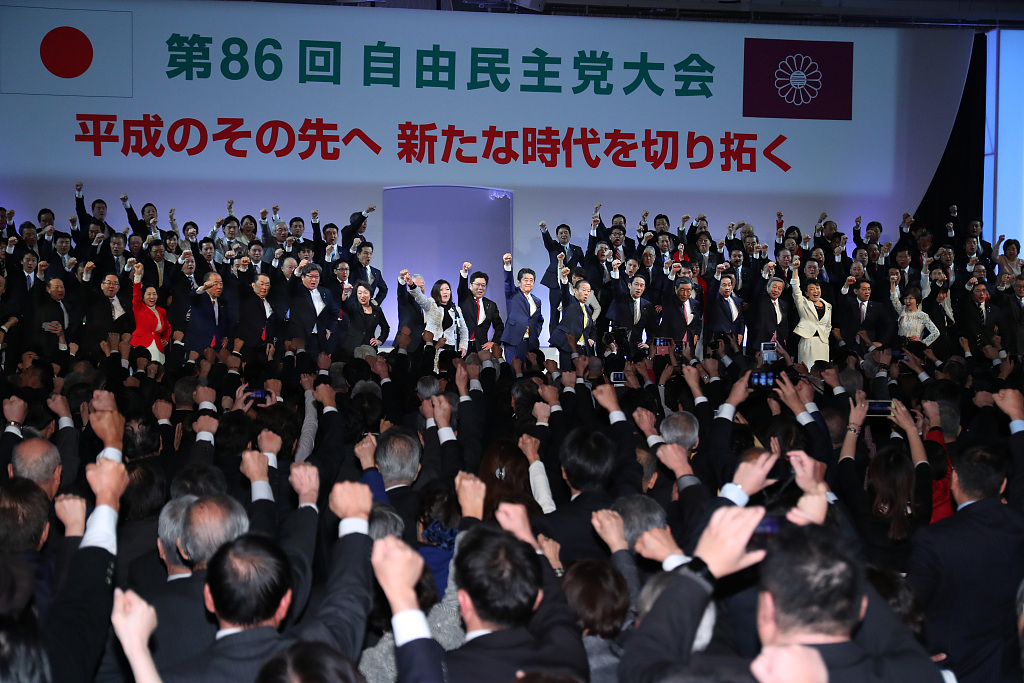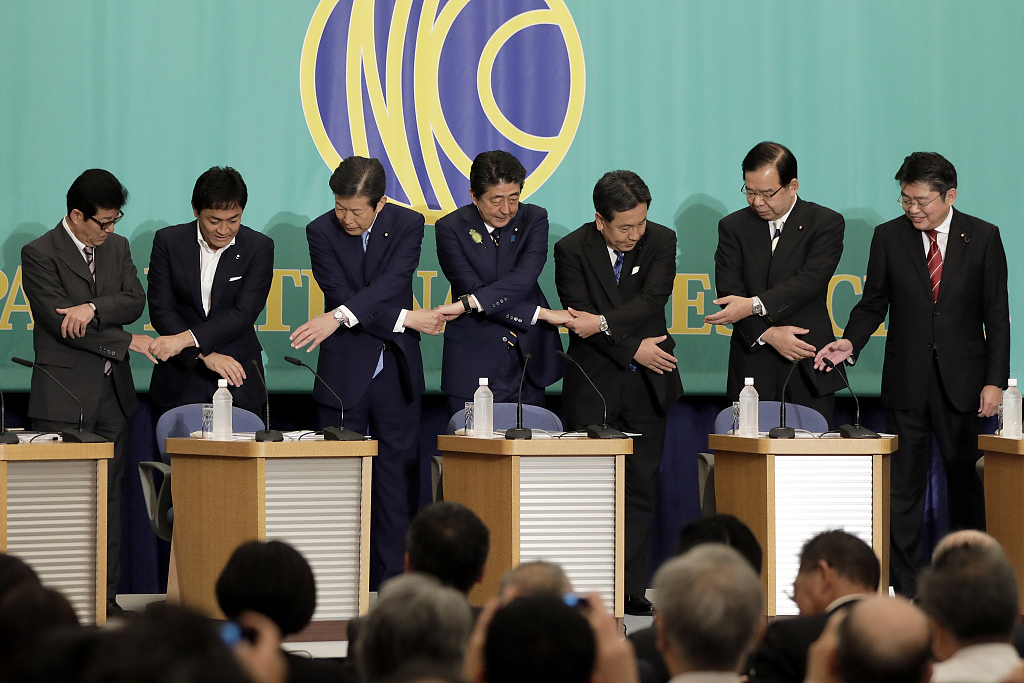

Editor's note: Chris Deacon is a postgraduate researcher in politics and international relations at the University of London and previously worked as an international commercial lawyer. The article reflects the author's opinion and not necessarily the views of CGTN.
Japan will hold elections for its Upper House on July 21 – a test of the continued popularity of Prime Minister Shinzo Abe and his ruling Liberal Democratic Party (LDP). The LDP performed particularly well when these seats were last elected in 2013. Will Abe's party be able to match its previous success?
Japan has a "bicameral"political system, with elections for both a Lower House and an Upper House. Upper House elections are held every three years for two different sets of seats. Thus, the same seats only come up for election once every six years. The electoral system is a somewhat complex mixed system, involving a vote for proportionally-elected seats, and a second district-based vote.

The annual LDP convention in Tokyo, Japan, February 10, 2019. /VCG Photo
The LDP performed particularly well in the 2013 Upper House election and currently enjoys a majority. However, analysts are predicting that the party will not be able to perform quite as well this time around and will likely lose its outright majority on July 21. That said, the LDP maintains a coalition arrangement with Komeito – a party linked to the Soka Gakkai Buddhist religious movement. It appears very likely that, even if the LDP loses its outright majority, its coalition majority with Komeito will be maintained.
Despite controversial scandals in recent years, including the Moritomo Gakuen scandal which potentially implicated both Abe and his wife in financial wrongdoing, Abe and the LDP's popularity appears high enough to avoid any major catastrophes. Abe is determined to become the longest-serving Japanese prime minister in history – a feat he will achieve on November 20 of this year – and so, will be anxious to ensure an acceptable result.
It was a poor performance by the LDP in the 2007 Upper House election that played a large part in Abe's resignation during his first term as prime minister. At that time, however, Japan appeared to quickly be moving towards a two-party system in which the LDP and the Democratic Party (DPJ) would alternate in power. Therefore, there was a relatively strong and united main opposition for the LDP to face.
Since then, the opposition has fragmented into multiple parties which are now struggling to mount a major challenge.
The largest opposition party currently is the still relatively new Constitutional Democratic Party of Japan (CDPJ). The CDPJ was formed when the old DPJ split as some members joined the breakaway Party of Hope led by Tokyo governor Koike Yuriko.
Most of those left behind founded the CDPJ in order to provide a clear distinguishing feature in their opposition to Abe's proposals to reform the pacifist Article 9 of the Japanese Constitution.

Party leaders of Japan join hands during a photo session prior to a debate ahead of the Upper House election, Tokyo, Japan, July 3, 2019. /VCG Photo
Opposition parties in Japan have struggled in the past to coordinate against LDP dominance.
They have agreed in this election to team up to put forward only one opposition candidate in districts where only one councillor will be elected, in order to prevent a splitting of the opposition vote. While this will potentially harm the LDP's success, it will be unlikely to have a major effect given that the agreement does not apply to multiple-member districts or the proportional vote.
Another area that may be of concern for Abe and the LDP is the increase in Japan’s sales tax, currently due to be implemented on October 1. Long a part of Abe's economic plan, sales tax increases have been repeatedly delayed partly due to strong public opposition. Other parties arguing against the tax increase may well see a boost to their success in this election as a result.
Abe's constitutional revision proposals will also be on voters'minds. Such a revision requires a two-thirds majority in each of the Lower and Upper Houses; however, Abe has enjoyed such majorities for some time now and still not gone ahead with attempting to implement the changes. Abe, however, is now intent on leaving a legacy in his final two years in power, and – should the numbers still allow it after this election – may return his focus to this agenda.
One prediction from many analysts that has not come true is a "double election" in which Abe also dissolves the Lower House to trigger a vote in both chambers. Abe's decision not to go ahead with such a move may betray that the Japanese Prime Minister is not going into these elections with as much confidence as he might.
(If you want to contribute and have specific expertise, please contact us at opinions@cgtn.com.)

Copyright © 2018 CGTN. Beijing ICP prepared NO.16065310-3
Copyright © 2018 CGTN. Beijing ICP prepared NO.16065310-3